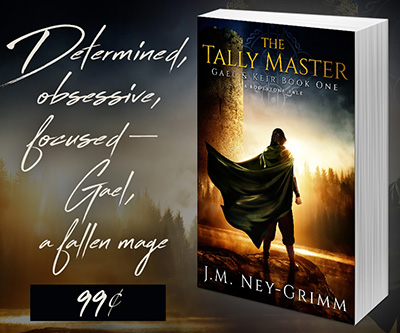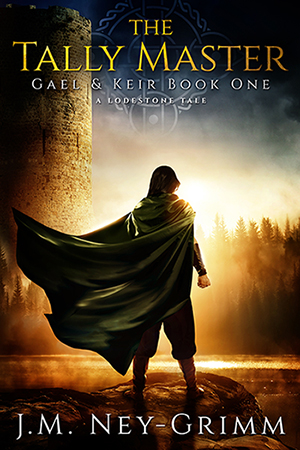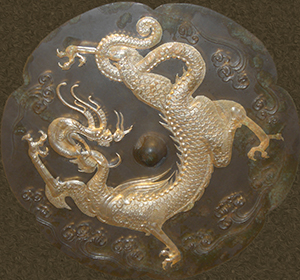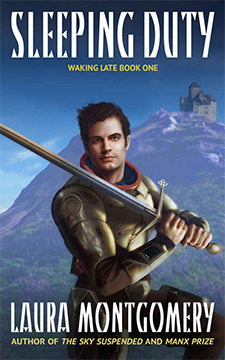 Gael thought of the uppermost great hall as Carbraes’ hall, but it wasn’t. Or rather, it both wasn’t and was.
Gael thought of the uppermost great hall as Carbraes’ hall, but it wasn’t. Or rather, it both wasn’t and was.
Only the elite of Belzetarn were invited to dine with Carbraes in his high hall, located just below the regenen’s chambers at the top of the tower. But Carbraes himself was as likely to dine in the main great hall or even the lower one. He believed in mingling with the trolls he led and protected.
This evening Carbraes had chosen the main hall, so Gael sat at the high table there on a dais below the vast bank of windows in a northern bay carved from the tower’s thick wall. Bright banners hung long on the bay’s sidewalls, which opened into the central space, an immense circular vault with curving balconies rising three high to each side. An ornate stairway curled around a massive central pillar.
Gael regarded that pillar with proprietary pride.
The pillar rose from the tower’s foundations through every level, eventually taking the form of a tall, flaring column at the center of the regenen’s terrace.
High into the air above Belzetarn, the pillar vented the fumes and smokes from Gael’s smithies.
A carved balustrade guarded the stairs circling around the outside of the pillar, and oil lanterns hung at intervals cast illumination. The stairs did not reach all of the tower’s levels. Only the venting pillar did that!
Beyond the stairway, a southern bay with another vast bank of windows flooded the hall with golden evening sunlight.
Altogether, Carbraes’ main hall was thrice the size of Heiroc’s banquet hall in Hadorgol.
The hubbub of five-hundred trolls feasting rose through the air—voices murmuring or exclaiming, the chink of two-tined fork against copper platter, the scrape of a serving tripod against the stone floor, the footfalls of the scullions carrying food from the kitchens and refilling mead bowls.
The sharp scent of a mustard sauce and the sweetness of a raspberry compote threaded the aromas of roasted meats and braised fish.
“Should you care to watch the first gladiatorial contest presented by my brother-in-arms Dreben?” asked Gael’s lefthand neighbor at table, the brigenen of the Ninth Cohort, one of three currently on rotation at the citadel. “I can procure you an invitation.”
“Bloodshed does not entertain me,” answered Gael, striving for an urbane tone. This was not the place for serious dissent. “Reserve your invitation—” He pressed his lips closed, before his voice could sharpen.
“Some will attend for their amusement, no doubt,” said the brigenen, “but Dreben possesses reasons besides entertainment for his enterprise.”
Gael lifted an eyebrow, skeptical.
“Our Ghriana foe wield magical weapons,” stated the brigenen.
“I’ve heard that rumor before,” said Gael.
“Ah, but it is no rumor. Ghrianan weapons are better than ours: sharper, faster, less prone to breakage, and dealing more damage. While our lord, in his prudence, shields us from the dangers of magery and the making of weapons with that magery, he exposes his warriors to greater danger on the battlefield.” The brigenen’s face held a knowing look.
“I wholly agree with the regenen and support him in his decree,” said Gael flatly. How dared the brigenen skate so close to criticism of Carbraes, while sitting at Carbraes’ own table, a mere two places down from him?
“As do I support him,” agreed the brigenen. “But if we are to be deprived of enchanted weapons of our own, we ourselves must be better, stronger, faster, and more ferocious. The gladiatorial ring will push our warriors toward supreme fitness.”
“I cannot approve something that pits troll against troll,” grated Gael. “We have enemies enough without bringing enmity into Belzetarn itself.” His urbanity was decidedly failing. He’d best change the subject.
“I am sorry you disapprove Dreben’s innovation.” The brigenen managed the necessary urbanity with no difficulty, but turned away to address his lefthand neighbor, one of the castellanum’s stewards.
Gael raised a spoonful of raspberry compote to his lips. The burst of strong flavor—sweet and floral with a hint of tartness—soothed his distaste. He was here to take the pulse of Belzetarn’s denizens, and news of Dreben’s gladiatorial ring had clearly spread.
To Gael’s immediate right sat the march, Dreas, commander of every warrior in Carbraes’ legions. Beyond the march sat Carbraes himself. The contrast between the march and the regenen was sharp, even while their similarities were strong.
Carbraes had changed his garb for the feast, donning gray suede sewn with sea pearls, but he projected his usual aura of calm power and confidence. His icy blue eyes were direct in their gaze. His ears lay neatly below the short, silver-threaded curls of his hair. Carbraes’ troll-disease rested lightly upon him.
March Dreas wore beige suede ornamented with bronze rivets and brown embroidery—simple garb in natural colors, like that of the regenen. His thinning white hair was clubbed back in a shoulder-length braid. His gray eyes looked straightly, and power flowed easily from him—also like the regenen.
But troll-disease bore hardly upon Dreas. A deathly pallor underlay the chapped redness on the surface of his skin. Deep furrows bracketed his eyes and his mouth. The flesh of his neck lay slack and folded. His ears were very large and deeply cupped.
The personality of the march must be immense to convey mastery—as it did—in the face of such physical infirmity.
Carbraes leaned forward slightly to address Gael across the march. “May I hope you will resume the use of your rightful quarters?” he asked. “Surely their greater comfort would be a solace in the present time.”
He was referring—if obliquely—to Gael’s new responsibility for the accursed gong, which not all here would know about, and to the fact that Gael’s chambers above the tally room were not his proper quarters. Carbraes’ four principal deputies—the castellanum, the march, the magus, and the secretarius—received luxurious apartments near the regenen’s own. But Gael had declined his, preferring the modest chambers convenient to his tally room and much nearer the smithies than the lofty tower top.
Carbraes had respected his wishes. And everyone did know that.
“Theron here”—Carbraes nodded at the castellanum seated beyond the magus on his farther side—“could order your suite freshened and furnished in a trice. By tonight, I dare say.”
Theron, garbed in brilliant robes of sky blue suede embroidered with shining copper thread, and engaged in close converse with the magus, caught both his name and the gist of Carbraes’ remark. He looked up, turning his disdainful face with its thin lips and elongated, but narrow nose toward Gael. His silver hair—straight and falling below his shoulders—added to his patrician mien. “The rooms should not go empty,” he said courteously. “Such a shame to waste their merits. Perhaps, if the Secretarius continues to scorn them, another might enjoy their benefits.”
The magus, attending to the castellanum, slewed around to face Carbraes.
Nathiar’s olive complexion was the same as when he, Erastys, Heiroc, and Gael had been friends in their youth. But his hair, now plaited in a myriad of thin braids, shone silver, his always-broad nose had grown broader still under the onslaught of his troll-disease, his green eyes were muddied, and his fleshy lips drooped unpleasantly.
“Knock a doorway through the wall of my receiving room,” he said flippantly. “I could use the additional space.” Despite the flippancy, his voice was deep and melodious.
The castellanum sniffed. “I had my principal steward in mind. He’s excellent and deserves to have his efficiency and his loyalty rewarded.” Theron’s voice chilled. “If you need a workroom, Nathiar, surely a less sumptuous chamber would be more suitable.”
The real issue—Gael knew—was that if Nathiar were granted the apartment of the secretarius in addition to his own, then the magus would possess quarters more grand than those of the castellanum. Theron could never abide it.
“No stairs to climb,” quipped Nathiar. “No need to dress, no need to shave. I like it!”
Carbraes raised a hand, stemming Nathiar’s gibes. “The chambers belong to Gael, whether he chooses to inhabit them or not.” His voice hardened. “I shall not bestow them elsewhere.”
Nathiar hid his smirk behind the sleeve of his robe, a garish scarlet ornamented with orange embroidery and copper rivets resembling rose blossoms.
Theron inclined his head graciously. “As you wish, Regenen. Naturally.”
Carbraes turned his back on them.
On an ornate saucer beside the regenen’s drinking horn, nested within green leaves of ground-elder, were two spoonfuls of rare fish roe—globules of glistening orange reserved for Carbraes alone.
The regenen scooped up half the minuscule heap on one of the leaves and offered it to the march. “Take this, my friend, it will do you good.”
Dreas demurred. “No more than it will nourish you. I cannot deprive you.” His voice was gravelly.
Carbraes said nothing, but his eyes smiled and his offering remained before the march. The pair locked gazes. Then Dreas gave way, accepting his regenen’s gift, conveying it immediately to his mouth. Gael noticed that the tremor in the march’s hand was larger than heretofore.
Carbraes ate the remaining roe simultaneously with Dreas. “Delicious, no?” he said.
“Surely it feeds something essential within the body,” answered Dreas. “How else could it satiate so uniquely?”
“You must share it with me every time my cook serves it,” declared Carbraes.
The corners of Dreas’ lips curled slightly, but he shook his head. “Did you know,” he asked, “that the poorest of the poor in the great city of Imster—those who survived on the leavings in the midden—sometimes ate earth? Especially the children.”
“No,” said Carbraes.
“I have seen it,” said Dreas. “It seemed that the food remnants could not nourish them sufficiently, and that the earth slacked some craving within.”
“We are not poor here in Belzetarn,” said Carbraes.
“No, but the affliction brings its own poverty, does it not? And its own cravings,” answered Dreas. “The roe heals, methinks.”
“Perhaps so. Perhaps so,” murmured Carbraes. Was that sorrow in his eyes? Or pity? Gael could not decide if it was either or neither.
Carbraes and Dreas had come to Belzetarn as young trolls, serving under a series of regenens in succession, always guarding one another’s backs, until they attained such rank as to make them unassailable. And even then they persisted in their mutual allegiance. Or so the rumors claimed.
Gael saw no reason to doubt it. It seemed likely that troll-disease would finish the march first. But not yet. And, meanwhile, Carbraes sought ways to delay the affliction’s hold on his friend.
This conversation between the two, conducted in lowered voices, had diverted its participants from the other conversation adjacent to them. Gael, however, heard both.
The castellanum had chosen to vent his further grievances against the secretarius into Nathiar’s ear.
“Always, he favors him!” Theron whispered. “He grants him two residences. He trusts his word in every particular. Even against my own testimony. Even in the face of contradictory evidence.”
Yes, well, there was reason for that. Carbraes knew perfectly well that Gael wanted nothing beyond what he already possessed: security in his office, control over his tally room, oversight of the smithies and weapons lodges, and the assurance of the regenen’s continuing regard.
Theron wanted much more. Control over the provisioning and maintenance of Belzetarn did not content him. He wanted leverage in the supply of Carbraes’ legions. He wanted a voice in the decisions that directed Carbraes’ military endeavors: which Ghriana strongholds to attack, which battlefields to hold, which camps to abandon. Theron wanted Gael’s own smithies under his purview.
Theron was willing to be unscrupulous in his means.
And Carbraes knew it.
“When Keir arrived in custody of the Fourth Cohort’s scouts,” continued Theron, “he should have been mine!”
Nathiar gave an encouraging grunt.
“I needed a new notary. Mine had succumbed to his affliction, and his successor had such a clumsy hand. Keir’s hand is so neat,” Theron mourned. “He would have added elegance to my office. He could have served me tea and berated the impudent scullions. But Carbraes refused to transfer him from the tally chamber. He should have been mine, and I still mean to have him.” Theron positively hissed.
Nathiar chuckled. “Surely not. The boy’s too pretty to be a notary at all. Make him magus penultimate, and I’ll find him uses in keeping with his comely face and neat ankles.”
Theron gasped. “The regenen would never let you!”
“The regenen would never know.”
Gael bit down hard on the spear of radish he’d raised to his lips.
The regenen might never know—although Gael would not bet on that—but the secretarius was damn mad. Nathiar, with his innuendo and carnal pranks and sensual preoccupations, disgusted him.
Well.
He’d dined in the great hall for a reason: to acquire news, maybe even learn secrets from the subtleties of expression and gesture. Now he had them with a vengeance. Most unpleasantly so, and with no subtlety at all.
Tangling with the lowliest in Belzetarn today—a lunch boy, a simple sweep—he’d suspected that it was the great ones who required his scrutiny.
Here were the great ones before him now.
The castellanum and the magus certainly possessed motive enough to make mischief in Gael’s tally room. Mischief, such as a theft would produce.
Nathiar hated Gael from their enmity of old. But Nathiar was too clever to leave evidence. If it were Nathiar stealing tin and bronze, the vaults would appear to be missing no ingots at all.
Theron, on his campaign to have all Belzetarn’s strings pass through his hands to the regenen’s, dearly wanted Gael’s tally room under his aegis and Gael’s smithies under himself as well. He envisioned Gael reporting to him, not directly to Carbraes. And, if he ever gained that, Gael would then be replaced with a troll Theron found more congenial.
But possessing motives for theft didn’t make a troll a thief. And how would Theron pull off such a theft? He was not clever.
Gael’s thoughts passed on to the other great ones present.
Would Carbraes have reason to steal from himself? It seemed unlikely.
Perhaps if the regenen pursued a secret project—something that contravened one of the rules he enforced rigorously amongst his trolls, such as forbidding the manipulation of energea. Could Carbraes be experimenting with weapons forged with the dangerous energea, the energea that glowed acrid orange instead of soothing blue?
Gael shook his head. That made no sense. If Carbraes were to pursue such a course, Gael would be the first one he’d involve. No, it couldn’t be Carbraes.
What of the march?
Even more ridiculous. Dreas would never betray Carbraes, not if he died for it. Although . . . how well did one troll ever know another?
Gael would rule none of them out at this time. But the magus and the castellanum would receive the brunt of his suspicion and scrutiny. They were more likely candidates for thievery, and—besides—they’d done the most to make tonight’s feast unpleasant.
Gael suppressed a quirk of his lips at this concluding irrationalism. He would find the true thief. He scorned to make either Theron or Nathiar a scapegoat, no matter the strength of his dislike for them.
The pair certainly fed his preference for dining alone in his chambers. But he’d learned back in Hadorgol that absence from the seat of power could be deadly.
The banquet hall of Hadorgol and the great hall of Belzetarn might appear very different. Belzetarn was colossal, fashioned on bold lines. Its banners featured simplicity: a black raven on a white field for the opteogint of the Ravens in the First Cohort; three yellow swords on a red field for the opteogint of the Triple Swords of the Eighteenth Cohort; a pair of red lynxes on a black field for the Twin Lynxes of the Seventh Cohort.
Hadorgol was elegant and intimate. Its banquet hall accommodated merely one hundred—not five—and featured delicate ivory embellishments, pastel murals, and exquisite intaglios. Even the heraldry tended toward complexity: a diagonal with a rose and green trellis pattern above, a blue and silver stripe below, and a white castle tower superimposed over both; a quartered field—with violet bells on a yellow ground in two quarters and red and blue diamonds in the other two—behind a white unicorn rearing.
But in the necessity of attendance, Hadorgol and Belzetarn were alike.
A Count Irvel had been a dearest friend of Heiroc’s father. The old count grew to prefer his home to court after his king died and the king’s son assumed his crown. No harm came of it for many years, but eventually another peer brought evidence of Irvel’s treason. After his execution, proof of Irvel’s loyalty surfaced, and then there was another execution: that of the lying peer.
None of it would have happened, if Heiroc had known Irvel well. Or if Irvel had gotten wind of the treachery soon enough. If Irvel had visited court more often.
Not that Gael had ever worried for himself in Heiroc’s court. His presence there was mandated by his position as the king’s magus, but motivated because he loved Heiroc, not because of the advantages that such a friendship might bring.
Belzetarn was less gentle than Hadorgol.
But it hadn’t been absence from his king that had finished Gael seven years ago. He remembered the last time he spoke with Heiroc all too well.
Next scene:
The Tally Master, Chapter 5 (scene 24)
Previous scene:
The Tally Master, Chapter 5 (scene 22)
Need the beginning?
The Tally Master, Chapter 1 (scene 1)
















